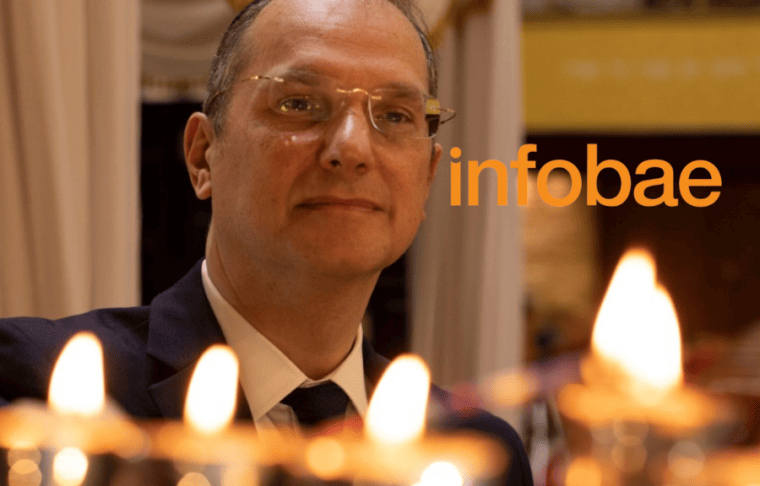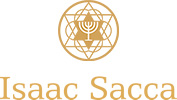Isaac Sacca and his message of Hanukkah

Article published by Infobae on November, 29th 2021
“The construction of a society is done through diversity”
The Chief Rabbi of the Sephardic Community of Buenos Aires celebrated the beginning of the party of the Jewish religion that commemorates the heroic deed of the Maccabees. The story of an armed struggle for religious freedom that for Sacca is still in full force
“It is better to live together with different opinions, than to live with a single opinion that was imposed by force ”, defines Isaac Sacca, the chief rabbi of the Sephardic Community of Buenos Aires and president of Menora, World Jewish Organization for the Youth. He says it in a reflective, teaching tone. He is inspired by the beginning of Hanukkah, which, according to the Jewish calendar, is celebrated from Kislev 25th to Tebet 2nd or 3rd. This year, 2021, it was inaugurated with the sunset of Sunday, November 28th and ends during the afternoon Monday, December 6th.
Hanukkah is, for the rabbi, the festival that celebrates diversity. It has its roots in history: it recalls the events of 168-164 BC, when the territory of Judea was dominated by the Seleucid Empire, one of the successors to the empire of Alexander the Great, in which a series of decrees that severely restricted religious freedom and the autonomy of the Jewish people were imposed. “It has to do with the recovery of the independence of the Jewish citizenship that lived in the land of Israel by a group of people who rebelled against the authority that wanted to impose the Greek and Hellenic culture on the Jews living in the land of Israel -expresses Sacca-. They did not accept to assimilate, to lose their identity, their traditions, their customs. It is not that they rebelled against the authority of the day, but that they rebelled against the attitude of wanting to take away their identity as a people. They took up arms, fought against the oppressor, conquered and regained the sovereignty of the country of Israel ”.
“This is the historical event that we remember: recovering our identity, sovereignty, the control of our own destiny as a people and not that another people come to impose how a people should think, speak, behave. That is Hanukkah ”, he synthesizes. The dynasty of the Hasmonaim extended for 200 years: in honor of the reopening of the temple, the Menorah was lit, the eight-branched candelabrum that became a symbolic emblem of the Hanukkah celebration, which meaning represents the inauguration.“:quality(85)/cloudfront-us-east-1.images.arcpublishing.com/infobae/DEJOC345BJHKFI62F7GXK47OEI.jpg%20420w) The traditional Hanukkah greeting is “Chag Sameach”, which is translated as “have a happy party”
The traditional Hanukkah greeting is “Chag Sameach”, which is translated as “have a happy party”
The rabbi explains it well: “The day in which the great temple of Israel was recovered, as the first act of inauguration of a temple that wasn’t in use any more by order of the dominant empire, the menorah, a chandelier that was used in the great temple of Jerusalem, was lit again. That act was also related to a miracle: the oil lasted longer than it could last and remained as the main symbol of this commemoration ”.
The history of the heroic deed of the Maccabees indicates that when they took possession of the temple desecrated by Antiochus Epiphanes, they discovered that there was not enough pure oil to light the menorah. They needed an oil processed in a certain way, according to biblical standards, which required an eight-day job. The oil bottle found had liquid for a single day. They still lit the chandelier, even knowing that they should recharge the oil. “The miracle of the unnatural duration of candle oil teaches us that when one crosses and struggles for light, even with little power, the light miraculously overcomes corruption,” says Sacca.
“ If a few people have values, they can overcome many people who don’t ”, the Chief Rabbi describes as a message. But the main message of the festival is another: “The right of individuals, peoples and ideologies to be allowed to be, to exist,” defines Sacca. No one has the right or authority to force the other to think and act in a specific way. Human beings are free, not only in movement but free in thought. And the ideologies of the groups must be respected. When someone tries to massify ideas he is attempting against human nature. God created a world where ideas are different, where diversity exists and to attempt against it is to attack nature, against the growth of society and humanity. Here a sacrilege was committed: an empire wanted to conquer other peoples and not only manage them but also impose their ways of thinking, their religion, their ideas, their principles. The Jewish people was born on the Passover holiday with the concept of freedom. But freedom, at that time, was a freedom more related to the physical. Hanukkah comes to teach us a freedom of thought that must be respected and enslaving someone physically is as bad as enslaving someone ideologically ”.
“If a few people have values, they can overcome many people who don’t. The Hanukkah message is associated with the light of the menorah that is turned on and can take a lot of darkness away,” says Sacca.
Times and centuries have changed, but for the rabbi the Hanukkah message remains unalterable. “Although today we live in a world in which apparently no one wants to impose ideas by force on citizens, there are marketing methodologies or political strategies that in one way or another are used to impose ideas or opinions and spread them over to towns , strata or societies. Perhaps they are not aggressive mechanisms as in the Hanukkah season, but they are technological or psychological mechanisms which can overwhelm the right of the other to think, filter their opinion, block their identity ”.
Isaac Sacca offers a different angle of interpretation of history to give a precise entity to the historical event. He says that the Hasmonaim who rebelled against the Greek empire that dominated the land of Israel only did so when their autonomy of thought was in check: when the political administration was imposed on them they accepted submission, when they saw their ideology threatened, they reacted. “Hanukkah is a holiday that takes on greater validity every day. It teaches us to respect each other, each with their ideology, their way of thinking. The construction of a healthy society is done through the diversity of opinions and that makes us a better society. Not imposing theories, not unifying criteria, but promoting ideas in order to build a community that progresses and emerges from darkness into light ”, he argues.
And he concludes with a new teaching: “Today the best way to fight against oppressors who want to take the identity of a people away, is not armed struggle, it is not aggression, but to turn on lights, illuminate, clarify, explain to the people what their identity is and explain to the rest of the ideologies what the identity that we do not want to abandon is. That is the best way to keep a culture alive: not by attacking those who think differently, but by explaining and clarifying the culture itself. Because, after all, who knows who is right?
Source: www.infobae.com

